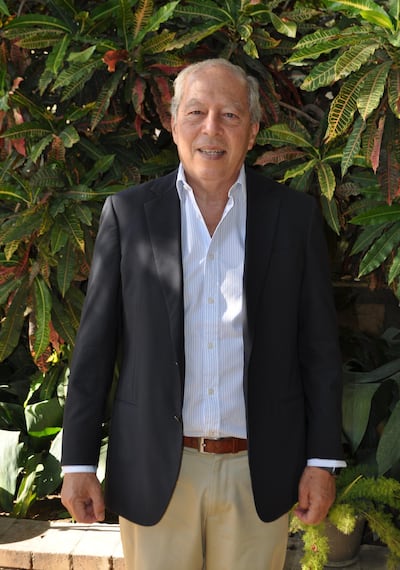Last month security forces in northern Egypt arrested a woman who for two years allegedly kept her 28-year-old son in a locked room with an iron door because he was suffering from a mental illness.
The mother said her son was being treated at the public Demeira Psychiatric Hospital in the Delta region and had been discharged. After his condition deteriorated again, the hospital refused to readmit him, Al Arabiya reported.
Public health officials intervened to provide support for the family and ensure his readmission to Demeira. The director of the hospital declined to comment.
The case highlights many of the challenges when dealing with mental illness in Egypt.
Shortages in space, funding and staff in the country's public psychiatric hospitals and the lack of a community-based approach to treating patients exacerbates Egypt's inability to provide the mental health services necessary.
Meanwhile, family members treat mental illness as something shameful to be hidden away.
“If someone suffers from a psychiatric disorder and they go to hospital, the expectation is that they get treated and come out again,” said Dr Nasser Loza, director of the private Behman Psychiatric Hospital and chair of the Egyptian Society for the Rights of People with Mental Illness.
“But there seems to be a growing culture that people wouldn’t mind keeping their son or daughter in hospital forever … and that’s quite a task in a country of 100 million,” said Dr Loza, who has been a psychiatrist for more than 25 years and previously worked for the government as secretary general for mental health.
'Mental disorders is like being possessed'
A quarter of Egyptians suffer from psychological disorders or symptoms of disorders, according to a 2018 National Mental Health Survey conducted by the Ministry of Health.
Mental illness continues to be stigmatised in Egypt and elsewhere in the Arab world.
"Some people think mental disorders are a punishment from God, or being possessed by a jinni or a ghost ... it's society-related, it's culture," said Dr Michael Fawzy, who for a decade worked as a consultant psychiatrist to Abassia, Egypt's oldest and largest psychiatric hospital.
Abassia was founded in the 1880s under the British protectorate and is a relic of Egypt’s adoption of the western insane asylum model.
The West has since moved on. During the 1960s, prominent voices in the psychiatric community began to advocate deinstitutionalisation – a movement to treat patients in the community, rather than in prison-like institutions.
But the same did not happen in the Middle East and North Africa region, said Paris-based researcher Joelle Abi-Rached in a May 2020 article in the British Journal of Psychiatry.
"Egypt is way above the Mena region in terms of number of psychiatric beds in mental hospitals instead of regular hospitals or community-based centres," Dr Abi-Rached told The National. "This clearly shows how mental health care in Egypt ... is still rooted in an outdated, indeed more carceral approach, to mental illness."
Severe shortage of funding
There are 18 government mental health hospitals, but only two psychiatric units in general hospitals and one community-based hospital in Egypt’s public health system, according to the World Health Organisation’s 2017 Mental Health Atlas. Out of 10,753 inpatients, 9,752 were involuntary admissions.
Sixty per cent of the beds are occupied by long-stay patients, according to the WHO, and the country’s public mental health hospitals are overwhelmed as a result, Dr Loza said.
“We have a large number of beds in Egypt, but they’re all blocked because the community will not take its patients back.”
Egypt’s mental health sector is also underfunded, making up less than 1 per cent of total government health expenditure.
“It’s not about funding, it’s about allocation of the resources,” said Dr Fawzy, who is now technical adviser at the Ministry of Health.
Inadequate staffing is another problem, with only 1.6 psychiatrists per 100,000 people in Egypt.
At the same time, the government has made efforts to improve mental health legislation and increase public awareness in recent years.
“A movement against institutionalisation has started,” said Dr Noha Sabry, a professor of psychiatry at Cairo University for more than 30 years.
New laws and new drawbacks
The Egyptian parliament ratified the first Mental Health Act in 1944, but it was not until the Mental Health Act of 2009 that patients’ rights were addressed in detail, such as the right of voluntary patients to consent to treatment. It also set criteria under which a person could be involuntarily admitted to mental health facilities.
President Abdel Fattah El Sisi ratified a new law in December amending some provisions of the 2009 legislation. It set penalties for those practising psychiatry without a licence and stipulated that a national council for mental health be formed to ensure patient safety and respect of their rights.
But critics of the new law – including the WHO, the World Federation for Mental Health and the World Psychiatric Association – say it also allowed doctors to give involuntary electroconvulsive therapy without a second opinion for up to three initial sessions.
"This legislation really takes psychotherapy away from psychologists … it empowers doctors at the expense of society and patients," Dr Loza said.
National awareness campaigns to reduce the stigma of mental illness began with televised adverts in 2007.
In 2017, the Ministry of Health launched a campaign, El Saraya El Safra, which means "the yellow palace" – a slang term for a mental health hospital.
“What we need to work on is educational programmes for the families – family therapy, family interventions,” Dr Sabry said.
Dr Loza said he is now focusing on trying to change cultural attitudes.
“You can’t just lock millions of people up,” he said. “At the end of the day families and the community have to take their share of the responsibility.”




